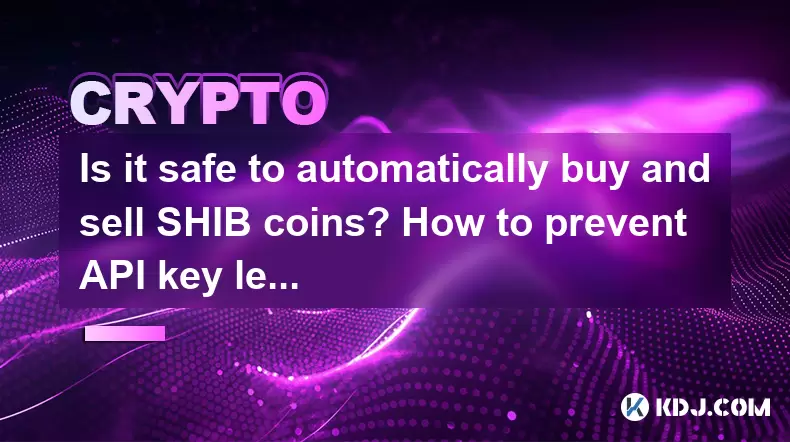-
 Bitcoin
Bitcoin $114000
0.76% -
 Ethereum
Ethereum $3488
0.53% -
 XRP
XRP $2.908
2.27% -
 Tether USDt
Tether USDt $1.000
0.05% -
 BNB
BNB $750.3
0.39% -
 Solana
Solana $161.9
0.14% -
 USDC
USDC $1.000
0.03% -
 TRON
TRON $0.3258
1.22% -
 Dogecoin
Dogecoin $0.1991
1.38% -
 Cardano
Cardano $0.7260
3.39% -
 Hyperliquid
Hyperliquid $38.20
2.33% -
 Stellar
Stellar $0.3987
7.33% -
 Sui
Sui $3.414
1.17% -
 Chainlink
Chainlink $16.28
2.52% -
 Bitcoin Cash
Bitcoin Cash $542.2
2.07% -
 Hedera
Hedera $0.2489
7.51% -
 Ethena USDe
Ethena USDe $1.001
0.05% -
 Avalanche
Avalanche $21.40
0.70% -
 Toncoin
Toncoin $3.635
0.75% -
 Litecoin
Litecoin $109.8
2.04% -
 UNUS SED LEO
UNUS SED LEO $8.955
-0.02% -
 Shiba Inu
Shiba Inu $0.00001221
2.44% -
 Uniswap
Uniswap $9.152
2.20% -
 Polkadot
Polkadot $3.588
2.09% -
 Monero
Monero $298.1
1.27% -
 Dai
Dai $1.000
0.01% -
 Bitget Token
Bitget Token $4.326
1.28% -
 Pepe
Pepe $0.00001045
1.96% -
 Cronos
Cronos $0.1330
4.27% -
 Aave
Aave $257.9
2.12%
Is it safe to automatically buy and sell SHIB coins? How to prevent API key leakage?
Automating SHIB trades can be risky; use secure bots, limit API key permissions, and monitor activity to prevent key leakage and unauthorized trades.
May 19, 2025 at 09:56 pm

Is it safe to automatically buy and sell SHIB coins? How to prevent API key leakage?
Automating the buying and selling of SHIB coins can be a convenient way to manage your cryptocurrency investments, but it comes with its own set of risks and security concerns. One of the primary concerns is the safety of using automated trading systems and the potential for API key leakage. In this article, we will explore the safety aspects of automating SHIB transactions and provide detailed guidance on how to prevent API key leakage.
Understanding Automated Trading and Its Risks
Automated trading involves using software or bots to execute buy and sell orders based on predefined criteria. This can include setting specific price points, volume thresholds, or other market indicators. While automation can help you take advantage of market opportunities without constant monitoring, it also introduces several risks.
One major risk is the potential for errors in the trading algorithm. If the bot is not properly configured, it could execute trades that result in significant losses. Additionally, automated systems can be vulnerable to market manipulation, where other traders might attempt to trigger your bot's buy or sell orders to their advantage.
Another critical risk is the security of the API keys used to connect your trading bot to your exchange account. If these keys are compromised, malicious actors could gain access to your account and execute unauthorized trades, potentially draining your funds.
Safety Measures for Automated SHIB Trading
To ensure the safety of your automated SHIB trading, it's essential to implement several security measures. First, choose a reputable trading bot that has a proven track record and strong security features. Research the bot's history, read user reviews, and ensure it has robust encryption and secure communication protocols.
Second, use a dedicated exchange account for your automated trading. This account should have a limited amount of funds, reducing the potential damage if the account is compromised. Regularly monitor the account's activity and set up alerts for any unusual transactions.
Third, implement strict trading limits and stop-loss orders. These can help minimize losses if the market moves against your positions. Set these limits carefully and review them regularly to ensure they align with your risk tolerance and investment strategy.
Preventing API Key Leakage
API key leakage is a significant concern when using automated trading systems. To prevent this, follow these detailed steps:
Generate API keys with limited permissions: When creating API keys on your exchange, ensure they have the minimum required permissions. For example, if your bot only needs to execute trades, do not grant it the ability to withdraw funds.
Use a secure method to store API keys: Never store your API keys in plain text or share them via unsecured channels. Consider using environment variables or a secure vault service to store your keys. This adds an extra layer of security by keeping the keys out of your codebase.
Regularly rotate your API keys: Change your API keys periodically to reduce the risk of them being compromised. Most exchanges allow you to regenerate keys, so make it a habit to do this every few months.
Monitor API key usage: Many exchanges provide logs of API key usage. Regularly review these logs to detect any unauthorized access or suspicious activity. If you notice anything unusual, immediately revoke the API key and investigate further.
Implement two-factor authentication (2FA): Enable 2FA on your exchange account to add an additional layer of security. This can help prevent unauthorized access even if your API keys are compromised.
Use a VPN: When connecting to your exchange or trading bot, use a Virtual Private Network (VPN) to encrypt your internet connection. This can help protect your API keys from being intercepted during transmission.
Best Practices for Secure Automated Trading
In addition to the specific measures for preventing API key leakage, there are several best practices you should follow to ensure the overall security of your automated SHIB trading:
Keep your trading bot and exchange software up to date: Regularly update your trading bot and exchange software to ensure you have the latest security patches and features.
Use strong, unique passwords: Use a password manager to generate and store strong, unique passwords for your exchange and trading bot accounts. Avoid reusing passwords across different platforms.
Educate yourself on common scams and phishing attempts: Stay informed about the latest scams and phishing techniques used to target cryptocurrency traders. Be cautious of unsolicited emails or messages asking for your API keys or other sensitive information.
Test your trading bot in a simulated environment: Before deploying your trading bot with real funds, test it in a simulated environment to ensure it behaves as expected. This can help you identify and fix any issues before they result in real losses.
Diversify your investments: Do not put all your funds into SHIB or any single cryptocurrency. Diversify your portfolio to spread risk and protect against significant losses in any one asset.
Monitoring and Responding to Security Incidents
Despite your best efforts, security incidents can still occur. It's crucial to have a plan in place for monitoring and responding to these incidents:
Set up real-time alerts: Configure your exchange and trading bot to send you real-time alerts for any unusual activity, such as large trades or withdrawals. This can help you respond quickly to potential security breaches.
Have a response plan: Develop a clear plan for what to do if you suspect your account has been compromised. This should include steps to revoke API keys, change passwords, and contact your exchange's support team.
Regularly review your security measures: Security is an ongoing process. Regularly review and update your security measures to ensure they remain effective against the latest threats.
Keep records of your transactions: Maintain detailed records of your SHIB transactions and API key usage. This can help you identify any unauthorized activity and provide evidence if you need to dispute transactions with your exchange.
Frequently Asked Questions
Q: Can I use the same API key for multiple trading bots?
A: It's not recommended to use the same API key for multiple trading bots. Each bot should have its own unique API key with the minimum required permissions. This helps limit the potential damage if one bot is compromised.
Q: How often should I check my trading bot's performance?
A: You should check your trading bot's performance at least daily, if not more frequently. Regular monitoring can help you catch any issues early and adjust your trading strategy as needed.
Q: Is it safe to share my API key with a third-party service for analysis?
A: No, it's not safe to share your API key with any third-party service. Doing so could expose your account to unauthorized access. If you need analysis, use the exchange's built-in tools or securely export your transaction data for analysis without sharing your API key.
Q: What should I do if I suspect my API key has been compromised?
A: If you suspect your API key has been compromised, immediately revoke the key, change your exchange account password, and enable 2FA if you haven't already. Contact your exchange's support team to report the incident and follow their guidance on securing your account.
Disclaimer:info@kdj.com
The information provided is not trading advice. kdj.com does not assume any responsibility for any investments made based on the information provided in this article. Cryptocurrencies are highly volatile and it is highly recommended that you invest with caution after thorough research!
If you believe that the content used on this website infringes your copyright, please contact us immediately (info@kdj.com) and we will delete it promptly.
- XRP: Crypto Analyst's Smartest Buy in 2025?
- 2025-08-04 00:30:13
- SEC, Crypto Regulation, and Digital Assets: A New Era?
- 2025-08-04 00:30:13
- Navigating the Meme Coin Mania: Cold Wallets, SHIB, and DOGE in 2025
- 2025-08-03 22:30:16
- Bitcoin's Price Fall and Scrutiny: What's a New Yorker to Think?
- 2025-08-03 22:30:16
- Shiba Inu's Resistance and Recovery Push: What's Next for SHIB?
- 2025-08-03 22:50:16
- Bitcoin, Hashcash, and Crypto Innovation: A Look at the Foundation and Future
- 2025-08-03 23:12:53
Related knowledge

What is Chainlink (LINK)?
Jul 22,2025 at 02:14am
Understanding Chainlink (LINK): The Decentralized Oracle NetworkChainlink is a decentralized oracle network designed to bridge the gap between blockch...

What is Avalanche (AVAX)?
Jul 22,2025 at 08:35am
What is Avalanche (AVAX)?Avalanche (AVAX) is a decentralized, open-source blockchain platform designed to support high-performance decentralized appli...

What is Polkadot (DOT)?
Jul 19,2025 at 06:35pm
Understanding the Basics of Polkadot (DOT)Polkadot (DOT) is a multi-chain network protocol designed to enable different blockchains to transfer messag...

What is Litecoin (LTC)?
Jul 23,2025 at 11:35am
Overview of Litecoin (LTC)Litecoin (LTC) is a peer-to-peer cryptocurrency that was created in 2011 by Charlie Lee, a former Google engineer. It is oft...

What is Monero (XMR)?
Jul 21,2025 at 10:07am
What is Monero (XMR)?Monero (XMR) is a decentralized cryptocurrency designed to provide enhanced privacy and anonymity for its users. Unlike Bitcoin a...

How to add indicators to Ethereum chart on TradingView?
Jul 19,2025 at 07:15am
What Is an Ethereum Chart on TradingView?The Ethereum chart on TradingView is a visual representation of the price movement of Ethereum (ETH) over a s...

What is Chainlink (LINK)?
Jul 22,2025 at 02:14am
Understanding Chainlink (LINK): The Decentralized Oracle NetworkChainlink is a decentralized oracle network designed to bridge the gap between blockch...

What is Avalanche (AVAX)?
Jul 22,2025 at 08:35am
What is Avalanche (AVAX)?Avalanche (AVAX) is a decentralized, open-source blockchain platform designed to support high-performance decentralized appli...

What is Polkadot (DOT)?
Jul 19,2025 at 06:35pm
Understanding the Basics of Polkadot (DOT)Polkadot (DOT) is a multi-chain network protocol designed to enable different blockchains to transfer messag...

What is Litecoin (LTC)?
Jul 23,2025 at 11:35am
Overview of Litecoin (LTC)Litecoin (LTC) is a peer-to-peer cryptocurrency that was created in 2011 by Charlie Lee, a former Google engineer. It is oft...

What is Monero (XMR)?
Jul 21,2025 at 10:07am
What is Monero (XMR)?Monero (XMR) is a decentralized cryptocurrency designed to provide enhanced privacy and anonymity for its users. Unlike Bitcoin a...

How to add indicators to Ethereum chart on TradingView?
Jul 19,2025 at 07:15am
What Is an Ethereum Chart on TradingView?The Ethereum chart on TradingView is a visual representation of the price movement of Ethereum (ETH) over a s...
See all articles

























































































